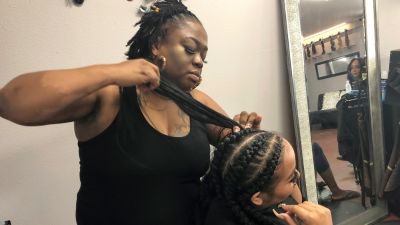New York becomes second US state to ban hair discrimination

New York has become the second state in America to ban discrimination against race-related hairstyles, only weeks after California made the landmark move.
The legislation amended the Dignity for All Students Act, and updated the definition of ‘’race’ to include "traits historically associated with race, including but not limited to, hair texture and protective hairstyles”.
The bill added: "Protective hairstyles" shall include, but not be limited to, such hairstyles as braids, locks, and twists.”
The bill’s provisions, otherwise known as the CROWN Act (Create a Respectful and Open Workplace for Natural Hair”) came into immediate effect.
Governor Andrew Cuomo, the legislator behind the signing of the bill, stated: “We are taking an important step toward correcting that history and ensuring people of colour are protected from all forms of discrimination."
Assembly Member Tremaine S. Wright, one of the main champions of the cause, said: "As a Black woman who prioritises equality and has worn my natural hair for 17 years, this bill is deeply personal for me.
“I determined a legislative fix was in order, and decided I'd carry the CROWN Act in NY. I am beyond proud to have done so, and for New York to be the first state to have had this historic bill passed in both chambers.”
California was the first state to make it illegal to discriminate against employees and students for their hairstyles, passing the CROWN Act earlier this month.
New York City was the first place in the US to pioneer the movement against hair discrimination.
In February, The New York City Commission on Human Rights released guidelines banning discrimination on the basis of hairstyle, with penalties of up to $250,000 for offenders.
In its guidelines, it stated: “Bans or restrictions on natural hair or hairstyles associated with black people are often rooted in white standards of appearance and perpetuate racist stereotypes that black hairstyles are unprofessional.”
“Such policies exacerbate anti-Black bias in employment, at school, while playing sports, and in other areas of daily living.”
Mariam Jimoh is the founder of WCAN, a London-based socialenterprise helping black women with professional development.
She says these new laws and guidelines are a “step in the right direction”.
"It's definitely a good thing if it stops women from being judged for their hair," she said.
She told ITV News that hairstyle is a common issue raised within her organisation.
“There isn’t one WCAN event we’ve held about the workplace where the topic of hair in the corporate world hasn’t come up."
Ms Jimoh said she sometimes wears her hair in a braid, but coming from an investment banking background, she often felt pressured to change her natural hairstyle.
“A lot of people think it doesn’t matter, but my hair always something at the back of my mind," she said.
"It's natural for black women to think about how their hair affects the way people see them."
There have been many controversial cases in the UK in which people have claimed to be discriminated against for their hairstyles, extending beyond the workplace and into the playground.
Earlier this year, a five-year-old was banned from playing in the playground for having an ‘extreme’ haircut.
Another incident in Fulham caused protests, after a school told a pupil with a Rastafarian background to cut off his dreadlocks or face suspension.
However, Ms Jimoh believes the dynamic is shifting, with more people choosing to go au naturel when they are out and about.
She hopes this will mean she and others won't have to continue conforming to Anglo-centric ideals.
"Personally, I don’t want to feel that I have to wear straight hair extensions to work in an investment bank.
“It’s a political thing, like these women are saying, 'I’m rejecting ideals that have been forced on me'.”